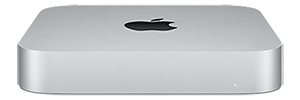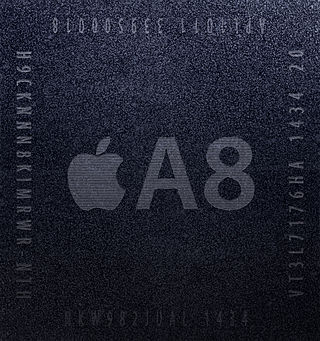
Apple Inc. is an American multinational technology company headquartered in Cupertino, California, United States. Apple is the largest technology company by revenue and, as of June 2022, is the world's biggest company by market capitalization, the fourth-largest personal computer vendor by unit sales and second-largest mobile phone manufacturer. It is one of the Big Five American information technology companies, alongside Alphabet, Amazon, Meta, and Microsoft.

The Apple Computer 1, originally released as the Apple Computer and known later as the Apple I or Apple-1, is an 8-bit desktop computer released by the Apple Computer Company in 1976. It was designed by Steve Wozniak. The idea of selling the computer came from Wozniak's friend and Apple co-founder Steve Jobs. The Apple I was Apple's first product, and to finance its creation, Wozniak sold his HP-65 calculator for $500 and Jobs sold a second hand VW Microbus, for a few hundred dollars. Wozniak demonstrated the first prototype in July 1976 at the Homebrew Computer Club in Palo Alto, California.

The Apple II is an 8-bit home computer and one of the world's first highly successful mass-produced microcomputer products. It was designed primarily by Steve Wozniak; Jerry Manock developed the design of Apple II's foam-molded plastic case, Rod Holt developed the switching power supply, while Steve Jobs's role in the design of the computer was limited to overseeing Jerry Manock's work on the plastic case. It was introduced by Jobs and Wozniak at the 1977 West Coast Computer Faire, and marks Apple's first launch of a personal computer aimed at a consumer market—branded toward American households rather than businessmen or computer hobbyists.

AutoCAD is a commercial computer-aided design (CAD) and drafting software application. Developed and marketed by Autodesk, AutoCAD was first released in December 1982 as a desktop app running on microcomputers with internal graphics controllers. Before AutoCAD was introduced, most commercial CAD programs ran on mainframe computers or minicomputers, with each CAD operator (user) working at a separate graphics terminal. AutoCAD is also available as mobile and web apps.

The iTunes Store is a digital media store operated by Apple Inc. It opened on April 28, 2003, as a result of Steve Jobs' push to open a digital marketplace for music. As of April 2020, iTunes offered 60 million songs, 2.2 million apps, 25,000 TV shows, and 65,000 films. When it opened, it was the only legal digital catalog of music to offer songs from all five major record labels.

The Macintosh LC II is a personal computer designed, manufactured, and sold by Apple Computer from March 1992 to March 1993. The LC II is an update to the original Macintosh LC, replacing its Motorola 68020 processor with a 68030 and increasing the onboard memory to 4 MB. The LC II was priced at US$1,699, fully $800 less than the original LC when it was introduced.
PowerVR is a division of Imagination Technologies that develops hardware and software for 2D and 3D rendering, and for video encoding, decoding, associated image processing and DirectX, OpenGL ES, OpenVG, and OpenCL acceleration. PowerVR also develops AI accelerators called Neural Network Accelerator (NNA).

The AGM-158 JASSM is a low observable standoff air-launched cruise missile developed by Lockheed Martin for the United States Armed Forces. It is a large, stealthy long-range weapon with a 450-kilogram (1,000 lb) armor piercing warhead. It completed testing and entered service with the U.S. Air Force in 2009, and has entered foreign service in Australia, Finland, and Poland as of 2014. An extended range version of the missile, the AGM-158B JASSM-ER, entered service in 2014. By September 2016, Lockheed Martin had delivered 2,000 total JASSMs comprising both variants to the USAF.
Amazon Prime Video, also known simply as Prime Video, is an American subscription video on-demand over-the-top streaming and rental service of Amazon offered as a standalone service or as part of Amazon's Prime subscription. The service primarily distributes films and television series produced by Amazon Studios and MGM Holdings or licensed to Amazon, as Amazon Originals, with the service also hosting content from other providers, content add-ons, live sporting events, and video rental and purchasing services.
Apple TV is a digital media player and microconsole developed and marketed by Apple Inc. It is a small network appliance hardware that plays received media data such as video and audio to a television set or external display. Since its second generation model, it is an HDMI-compliant source device and can only be connected to an enhanced-definition or high-definition widescreen television through HDMI to function.

Freemium, a portmanteau of the words "free" and "premium," is a pricing strategy by which a basic product or service is provided free of charge, but money is charged for additional features, services, or virtual (online) or physical (offline) goods that expand the functionality of the free version of the software. This business model has been used in the software industry since the 1980s. A subset of this model used by the video game industry is called free-to-play.

Material handling involves short-distance movement within the confines of a building or between a building and a transportation vehicle. It uses a wide range of manual, semi-automated, and automated equipment and includes consideration of the protection, storage, and control of materials throughout their manufacturing, warehousing, distribution, consumption, and disposal. Material handling can be used to create time and place utility through the handling, storage, and control of waste, as distinct from manufacturing, which creates form utility by changing the shape, form, and makeup of material.

A personal computer (PC) is a multi-purpose microcomputer whose size, capabilities, and price make it feasible for individual use. Personal computers are intended to be operated directly by an end user, rather than by a computer expert or technician. Unlike large, costly minicomputers and mainframes, time-sharing by many people at the same time is not used with personal computers. Primarily in the late 1970s and 1980s, the term home computer was also used.
AppleCare+ is Apple's brand name for extended warranty and technical support plans for their devices. AppleCare+ extends the devices' one year limited warranty and the 90 days of technical support. It also includes unlimited repairs for accidental damage repair at discounted prices every 12 months. The AppleCare Protection Plan is available for many Apple products including Mac computers and displays, Beats Headphones, HomePods, iPhones and iPads, Apple Watches, and Apple TVs. AppleCare plans include Apple software associated with the covered hardware. Customers can also buy additional support and training through AppleCare.

Mac Mini is a small form factor desktop computer developed and marketed by Apple Inc. As of 2022, it is positioned between the consumer all-in-one iMac and the professional Mac Studio and Mac Pro as one of four current Mac desktop computers. Since launch, it has shipped without a display, keyboard, and mouse. The machine was initially branded as "BYODKM" as a strategic pitch to encourage users to switch from PCs running operating systems such as Microsoft Windows and Linux.

Home computers were a class of microcomputers that entered the market in 1977 and became common during the 1980s. They were marketed to consumers as affordable and accessible computers that, for the first time, were intended for the use of a single nontechnical user. These computers were a distinct market segment that typically cost much less than business, scientific or engineering-oriented computers of the time such as those running CP/M or the IBM PC, and were generally less powerful in terms of memory and expandability. However, a home computer often had better graphics and sound than contemporary business computers. Their most common uses were playing video games, but they were also regularly used for word processing and programming.

The Apple A4 is a 32-bit package on package (PoP) system on a chip (SoC) designed by Apple Inc. and manufactured by Samsung. It was the first SoC Apple designed in-house. The first product to feature the A4 was the first-generation iPad, followed by the iPhone 4, fourth-generation iPod Touch, and second-generation Apple TV.

The adoption of plug-in electric vehicles in the France is actively supported by the French government through a bonus–malus system through which provides subsidies towards the purchase of all-electric vehicles and plug-in hybrids with low CO2 emissions. The government also provides non-monetary incentives; subsidies for the deployment of charging infrastructure; and long term regulations with specific targets. Additionally, France passed a law in December 2019 to phase out sales of cars that burn fossil fuels by 2040.

The Apple A8 is a 64-bit ARM-based system on a chip (SoC) designed by Apple Inc. It first appeared in the iPhone 6 and iPhone 6 Plus, which were introduced on September 9, 2014. Apple states that it has 25% more CPU performance and 50% more graphics performance while drawing only 50% of the power of its predecessor, the Apple A7. The latest software updates for the 1.1GHz and 1.4GHz variants systems using this chip are iOS 12.5.6, released on August 31, 2022 as they were discontinued with the release of iOS 13 in 2019, and 1.5GHz variant for the iPad Mini 4 is iPadOS 15.7.1, released on October 27, 2022 as it was discontinued with the release of iPadOS 16 in 2022, while updates for the 1.5GHz variant continue for Apple TV HD. The A8 chip was discontinued on October 18, 2022, following the discontinuation of the Apple TV HD.
The iPhone's hardware is designed by Apple Inc. Apple directly sub-contracts hardware production to external OEM companies, maintaining a high degree of control over the end product.














